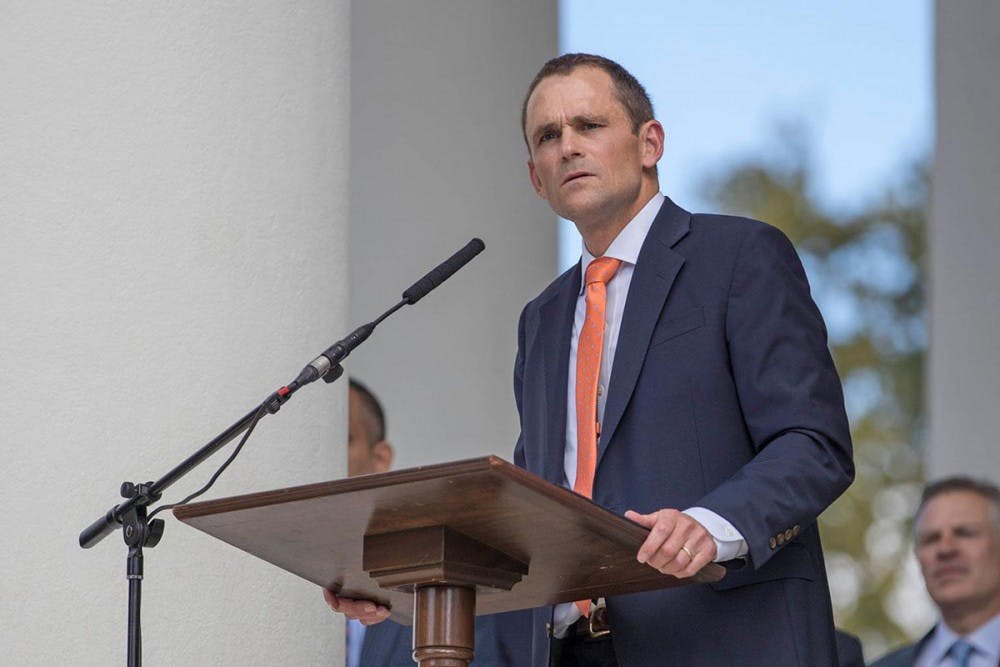In an interview earlier this month, University President President Jim Ryan stated, “the polls are open from six in the morning until seven at night and I would hope that that would be ample time for someone to exercise the right to vote.” It’s good to see the president’s support for civic engagement, but his words betray a basic fact: the administration lacks awareness of the obstacles that students face when voting and won’t take the necessary steps to remove them.
Students are busy. The University is often chosen as one of the toughest schools in the nation. It doesn’t help that Election Day often falls around the second round of midterms, when most students have an additional workload. With many students in class on Election Day, it can be difficult to find time to make it to the polls and back. While the movement of the polling precinct from University Hall to Slaughter Recreation Center makes accessing the polls much easier for first-years, many upperclassmen can only access their respective polling places by car. Information about voting, transportation to polling places and candidate platforms can be difficult to obtain as well, which creates additional stressors for students wishing to vote. The administration’s occasional reminders to register to vote or to turn out on Election Day often lack enough information, are too late and are easily lost among other tasks.
While it is true that absentee voting is often available for students in class on Election Day, the absentee ballot process can be confusing, and many students forget to request a ballot in time to vote absentee.
The task of overcoming these obstacles is left to student groups, such as Student Council, University Democrats and College Republicans. Student-led organizations have had some success, like registering first-years to vote as they moved in and circulating a faculty pledge not to hold significant exams on Election Day. Cooperation with University officials and faculty on these initiatives has been critical and shows the widespread support for efforts like this among many members of the University community. However, the greatest obstacle in organizing these efforts should not have been resistance from the University. Additionally, the onus for civic engagement should not be on unpaid students who lack access to resources that would make voting much easier. Instead, several universities employ staff focused on issues of civic engagement, including JMU, Duke, Northwestern, NYU and Richmond. The University should follow their example.
Many universities have taken action to reduce the obstacles students face when voting. For example, during move-in last year, Northwestern integrated voter registration into its move-in process, increasing registration from 39 percent to over 96 percent in one day. The University can do the same by requiring students to either register or opt-out of registering to vote through SIS. Some universities have even cancelled classes on election day, including Clemson, Princeton, West Virginia and Liberty.
The University should take several additional steps to increase access to the polls given the large number of student-heavy precincts. While the movement of the U-Hall polling place to Slaughter makes voting easier for first-years, many upperclassmen are literally “on the wrong side of the tracks” from their polling places. Rather than outsourcing this responsibility to volunteer groups such as CAR2Vote, the University needs to do its part to ensure students have a reliable way to get to the polls. The administration needs to commit to providing and funding shuttles to polling places, something it has resisted pressure to do in recent years. Similarly, the University needs to work with student groups to inform students, RAs and faculty about voter registration initiatives, deadlines and elections.
The University ranks a measly 1 on a 0-4 scale in Washington Monthly’s student voting rankings, the first such ranking to include civic engagement as a metric. Other peer institutions have taken the initiative by committing to measure, share and promote civic engagement on their campuses. For example, the presidents of all 14 Big Ten universities each pledged $10,000 for civic engagement initiatives last year. The administration should uphold our commitments to cross-university initiatives like the All-In Challenge by creating a voting action plan, and share our civic engagement progress by publicizing our National Study of Learning, Voting, and Engagement data, which measures campus-level voter registration and participation.
Students too can make an impact. Research shows that the strongest way to get people to vote is by making it a social norm. Make a plan to vote ahead of time, and be sure you know important dates. Pledge to be a Vote Tripler by committing to get three friends out to vote, and use #UVAVotes on election day to remind your friends. If you have a car, drive for CAR2Vote.
To its credit, the University has done some work to reduce obstacles to voting, including the relocation of the U-Hall polling precinct, tracking NSLVE data (although not making it public) and even forming a committee to assess community engagement. But we can do better. President Ryan’s words come across as uninspired in the face of the obstacles confronted by students. His endorsement of civic engagement is a welcome first step, but the administration needs to commit to do more if it wants to be seen as a place that supports student voting. Turnout comes with meaningful administrative efforts to alleviate the burdens that come with voting for students.
Alex Hendel is a third-year student in the College of Arts and Sciences.







